
Halas, Nordlander win prestigious Eni Energy Transition Award
Rice’s Naomi Halas and Peter Nordlander have won the prestigious 2022 Eni Energy Transition Award.

Halas, Nordlander win prestigious Eni Energy Transition Award
Rice’s Naomi Halas and Peter Nordlander have won the prestigious 2022 Eni Energy Transition Award.
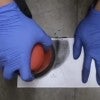
Water can’t touch this sanded, powdered surface
Rice scientists and engineers develop a one-step method involving sandpaper and powder to make robust superhydrophobic materials.
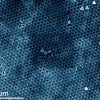
Tetrahedrons assemble! Three-sided pyramids form 2D structures
Rice chemists have discovered pyramid-shaped gold nanoparticles put their own twist on 2D self-assembly.
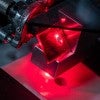
Strain-sensing smart skin ready to deploy
Carbon nanotubes’ natural fluorescence enables a method to detect high strain concentrations, which can lead to damage that threatens the integrity of critical infrastructure like aircraft, buildings, pipelines, bridges and ships.
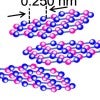
Flashing creates hard-to-get 2D boron nitride
Rice University chemists use their flash Joule heating process to synthesize 2D flakes of boron nitride and boron carbon nitride, highly valued for lending thermal and chemical stability to compounds.

Nobel laureate, beloved Rice professor Robert Curl dead at 88
Nobel Prize-winning chemist and beloved Rice University Professor Robert Curl died July 3 at age 88.
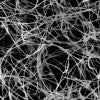
Boron nitride nanotube fibers get real
Rice scientists create the first boron nitride nanotube fibers using the custom wet-spinning process they developed to make carbon nanotube fibers.
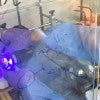
Process to customize molecules does double duty
Chemists develop a method to add two fragments to an alkene molecule in a single process, which could simplify drug and materials design.
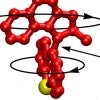
Bacteria-killing drills get an upgrade
Rice scientists have created light-activated molecular drills that can kill antibiotic-resistant bacteria.
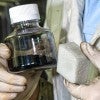
Cars could get a ‘flashy’ upgrade
Rice University chemists, working with the Ford Motor Company, processes waste plastic from end-of-life trucks into graphene for composite materials in new vehicles.

CPRIT grants entice three cancer researchers to Rice
Rice University recruits three professors to bolster cancer research with grants from the Cancer Prevention and Research Institute of Texas.
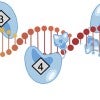
DAP array casts a wide net to fix mutations
Rice engineers introduce DAP, a streamlined CRISPR-based technology that can perform many genome edits at once to address polygenic diseases caused by more than one glitch.

Rice chemists skew the odds to prevent cancer
A theoretical framework by Rice University scientists shows how to increase the odds of identifying cancer-causing mutations before tumors take hold. They demonstrate that only a few energetically favorable pathways are likely to lead to cancer.
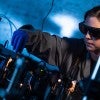
Rice ‘metalens’ could disrupt vacuum UV market
Rice photonics researchers have created a potentially disruptive technology for the ultraviolet optics market.

Faculty, staff, students honored for excellence in teaching, mentoring, service
Each year, Rice honors members of the university community who have served students through outstanding teaching, dedication and service.